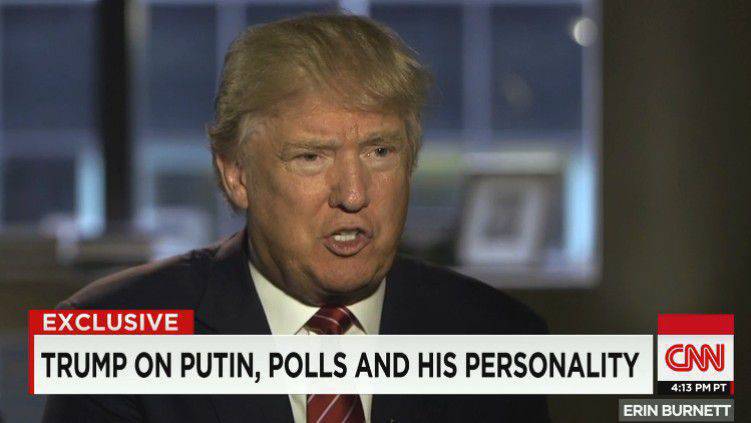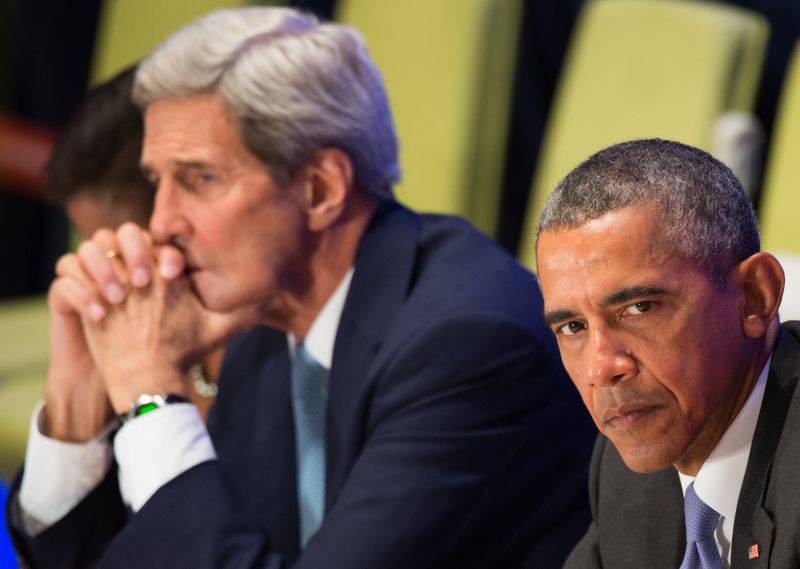Project "ZZ". Russians have changed the world order
The United States refused to demand the immediate resignation of the Syrian President, US Secretary of State John Kerry said. This was reported this morning "Lenta.ru"referring to CNN.
In an interview with the American television channel, D. Kerry noted that the Syrian conflict cannot be resolved without involving Sunni in the political life of Syria. And this “engagement” will take “some time.” The immediate resignation of Assad can lead to the destruction of civilian institutions and "collapse." “It is necessary to ensure an orderly transition, a managed transition,” the state secretary summed up, “so that there is no fear of retribution, revenge, fears for life.”
And - lo and behold! - Mr. Kerry admitted that the previous US approach to the change of power in Damascus was not viable.
In addition, the Secretary of State called the "opportunity" for the United States involving Russia in resolving the conflict in Syria.
The press spoke about changes in the world order.
In a Canadian newspaper "The Globe and Mail" An article by Mark McKinnon appeared, announcing a fait accompli - the phenomenon of a multipolar world. US hegemony seems to be no more.
Over the last quarter of a century, American presidents have been telling the inhabitants of the rest of the world how to live from the UN rostrum. The journalist recalls the military acts of Bill Clinton, who “justified” the NATO military campaign in Kosovo through the United Nations, George W. Bush, who intended to go to war with Saddam Hussein, Barack Obama, who “celebrated” the Arab Spring of Muhammar Gaddafi in Libya.
This time, from the UN podium, Obama “indirectly acknowledged” that the old chapter with the American world order is closed. The epoch of multipolarity (“for the better, for the worse) is already here.
Mr. Obama had to publicly admit his readiness to make contacts with Moscow and Tehran (“regarding the fate of Syrian President Bashar al-Assad”).
An hour after Obama, Russian President Vladimir Putin spoke out, who made it clear that Russia would not tolerate the status quo and that American rules in the world no longer apply.
Putin also said that he and Obama came to an agreement on improving relations and overcoming existing differences. Mr Putin, the analyst notes, earned applause, and in his speech he accused the United States of all the troubles on the planet! And a year earlier, this same Putin annexed the Crimean Peninsula, which belonged to Ukraine, to Russia. This very Putin, the political “villain,” Obama earlier scourged from the UN rostrum.
As a result, Mr. Obama reluctantly admitted that President Assad in Syria will most likely remain in the presidency of the president in the near future - at least until the “transfer” of power is organized. And not at all the president of the United States will decide alone what will happen next.
Swiss journalist Julian Hans ("Tagesanzeiger") believes that B.H. Obama’s biggest mistake was the assignment of the Russian Federation to “regional powers”.
The correspondent notes that military force still “rules” in the world, and there is no doubt about it. Economic integration, political balance and military power are interrelated. Putin’s intensive activities in the right direction prove this.
The Russian president, who had previously listened to the White House’s warnings about Syria, began to build an air base in Latakia. If not for this construction, he probably would have looked as lonely at the UN General Assembly as at the G-20 summit in November 2014 in Brisbane.
As for the Nobel peacemaker Obama, he turned out to be the losers. This time his slip was serious. He was mistaken in the most important thing - he referred Russia to regional powers.
Even if Obama believed in it, he should not have talked publicly about the “regionality” of Russia. Putin does not tolerate public humiliation!
Putin’s “Syrian response” made the Russian president an outstanding person at the UN General Assembly and provided him a personal meeting with Obama, the journalist said. A conversation between the presidents showed how Obama was wrong. Putin refuted the thesis of the American president about the "regional power". Putin made it clear that Russia will have to reckon with the world arena.
A fresh statement on the "Putin's" theme came from the American billionaire, a potential candidate for the US presidency from Republican Donald Trump. He gave an exclusive interview to the channel CNN.

A potential US presidential candidate openly supported the efforts of Moscow and Tehran in the fight against the "Islamic state" in Syria. According to the billionaire, Russia should be allowed to "deal with the" IG ". Trump does not support the zealots of the world order led by the United States who do not want Russia's participation in the fight against terrorists.
In addition, the Republican criticized the illogical behavior of the White House. “Why do we oppose IG and at the same time against Assad?” Trump asked. Then he tried to separate the duties of Russia and the American coalition: “Let Syria and the ISIS fight, let Russia take care of the IS. And we (the United States and their coalition allies. - O. Ch.) Can fight the "IS" in Iraq. "
We talked about President Asad. The host of the program asked whether Bashar Assad is true - the source of the troubles of Syria? Trump replied that he doubted that. It is impossible to say with absolute certainty that Assad is to blame for the misfortunes of the people of Syria.
As for the American policy of changing regimes that Washington dislikes, Trump criticized her as well.
“Some want us to come and replace Assad.” We (the USA. - O. Ch.) Always stand on the side of those people who later turn out to be worse than the former, ”the businessman said.
After the decisive actions of President Putin in Syria and after the UN General Assembly, which has become a kind of symbol of the geopolitical revival of Moscow, politicians and analysts realized that Russia is really not a “regional power”. Mr. Obama, the former "hegemon", had to not only publicly admit it, but also enter into negotiations with Putin about the future of Syria. Washington recognized the erroneous idea of the immediate removal of B. Assad from power.
From this point on, it became clear: the United States had lost the possibility of individual intervention in crises. At least they lost it in the Middle East.

Information